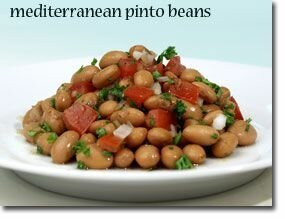healthy food tip and recipe
Today's Recipe
If you don't know what to serve for dinner tonight ...
If you sometimes find it difficult to think of new ways to prepare beans try this easy-to-prepare recipe that tastes great. Enjoy!

Ingredients:
- 1 large ripe tomato, seeds and excess pulp removed, diced
- 2 TBS finely minced onion
- 4 medium cloves garlic, pressed
- 1 TBS balsamic vinegar
- 2 TBS extra virgin olive oil
- 4 TBS chopped fresh parsley
- pinch red chili flakes
- salt and cracked black pepper to taste
- 2 cups or 1 15 oz can (BPA free) pinto beans, drained and rinsed
- Optional: 1/2 of 2 oz can rinsed and chopped anchovies
- Mince onions and press garlic and let sit for at least 5 minutes to enhance their health-promoting properties.
- Mix together all ingredients, except beans, in a bowl.
- Drain and rinse bean well. Toss beans with rest of ingredients. Let marinate for about 30 minutes before serving.
In-Depth Nutritional Profile for Mediterranean Pinto Beans
Healthy Food Tip
I am a vegan and I love mushrooms. How do you know if a mushroom is cultivated in manure or wood chips?
As far as I know, there is no way to tell just by looking—or by some other common sense test—whether a mushroom has been cultivated with the use of manure or wood chips. Even certified organic mushrooms can be grown with either manure or wood chips.
Yet, buying organic mushrooms will provide you with a higher quality food in which you can have greater confidence. For example, for certified organic mushrooms that have been cultivated with a mixture of oak shavings and whole grains, the whole grains used in cultivation of the mushroom spawn would themselves have to be free of many potential toxins. (Wood chips are considered as non-synthetic parts of "mulch" in the National Organics Program statutes and allowed for this reason.)
The National Organics Program also places some very important restrictions on the use of compost in production of all certified organic foods. Raw animal manure cannot be used less than 120 days prior to harvest if a food (including mushrooms) has an edible portion that comes into contact with the soil or soil surface. (Even if the food's edible portion does not come into contact with the soil or soil surface, raw animal manure is not allowed within 90 days of harvest.)
The restrictions on the use of raw animal manure help prevent crops from being contaminated with bacteria like E. coli 0157:H7. Organic food production does allow for unlimited use of composted manure, but this type of manure is far safer than raw manure and follows some very strict standards fully implemented in 2002. (These standards involve carbon-to-nitrogen ratios between 25:1 and 40:1 and maintenance between 131°-170°F (55-77°C) for a fixed number of days that varies depending on aeration procedure.)
I understand that most non-organic, commercially grown mushrooms in the U.S. have been cultivated with the use of compost containing some animal manure, often from chickens, cows, or horses. I have not yet seen non-organic, commercially available mushrooms that are designated "manure-free" in terms of their cultivation.
If you want to stay away from mushrooms grown with manure, you may want to consider growing mushrooms yourself. If you look online, you will find a good number of companies offering complete mushroom growing kits.
For more information on this topic, please see:

No comments:
Post a Comment